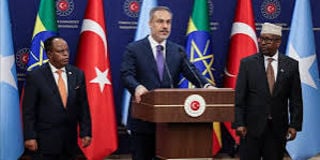Somalia's hard-line stance amid Ethiopia's maritime talks

Turkish minister Hakan Fidan (centre) mediate talks involving Ethiopia and Somalia Foreign Affairs in Ankara.
Somalia and Ethiopia have concluded a second round of talks aimed at resolving a maritime dispute that has threatened to disrupt the two countries' longstanding relationship.
The talks, involving the foreign ministries of the two countries, were mediated by Turkish Minister Hakan Fidan in Ankara.
The meeting aims to end a simmering diplomatic dispute between the two countries, caused by Ethiopia's deal with the breakaway region of Somaliland.
Somalia's Foreign Minister Ahmed Moalim Fiqi confirmed this on his X account after the meeting ended with a vote of thanks to Turkey.
Mr Fiqi also reiterated that Somalia remains steadfast in protecting the country's sovereignty, unity and territorial integrity, adding that the country will never be 'compromised'.
These sentiments were echoed in the Foreign Ministry's official statement on the two meetings held earlier in the week: "Somalia remains steadfast in safeguarding its sovereignty and territorial integrity, firmly committed to protecting its borders and ensuring national stability and security".
The Somali delegation to the talks has reportedly taken a hard line, refusing to move forward until Ethiopia publicly renounces a controversial naval base agreement with Somaliland.
This has led to a stalemate in the negotiations and the need for a third round of talks, which Somalia has already accepted in its official communication.

"There's no room for negotiation on this," said a source close to the talks, who requested anonymity due to the sensitive nature of the discussions.
The delegations from the two countries have not had face-to-face meetings and instead, Turkey has been playing the intermediary role between the two countries.
Turkish Foreign Affairs Minister Hakan Fidan separately met his counterparts from Somalia, Ahmed Moallim Fiqi, and Ethiopia’s Taye Atske Selassie.
Somalia President Hassan Sheikh Mohamud, has taken diplomatic steps since Ethiopia reached an agreement with Somaliland.
One of these steps includes appointing Ahmed Moalim Fiqi, a seasoned politician and diplomat, as the Minister of Foreign Affairs. This move aims to leverage his expertise in the efforts to safeguard Somalia's interests.
President Mohamud's administration has secured a significant diplomatic win after a maritime dispute with Ethiopia. Somalia has successfully defended its territorial rights. This has positioned him as a leader who can navigate complex diplomatic challenges.
Mohamud's leadership is credited with playing a key role in securing a favourable outcome for Somalia. Here are some possible aspects of his diplomatic strategy:
International Advocacy: The Mohamud administration likely lobbied for international support for Somalia's position based on the United Nations Convention on the Law of the Sea principles. This could have involved engaging with regional and global maritime organisations and garnering backing from friendly nations.
Focus on Peaceful Resolution: Despite the disagreement, President Mohamud likely prioritised maintaining a peaceful relationship with Ethiopia. This could have involved seeking diplomatic channels and avoiding escalation through public pronouncements.
Skilled negotiation: The successful resolution suggests Somalia's negotiation team, under President Mohamud's guidance, effectively presented their case and secured a solution that upholds Somalia's maritime rights.




